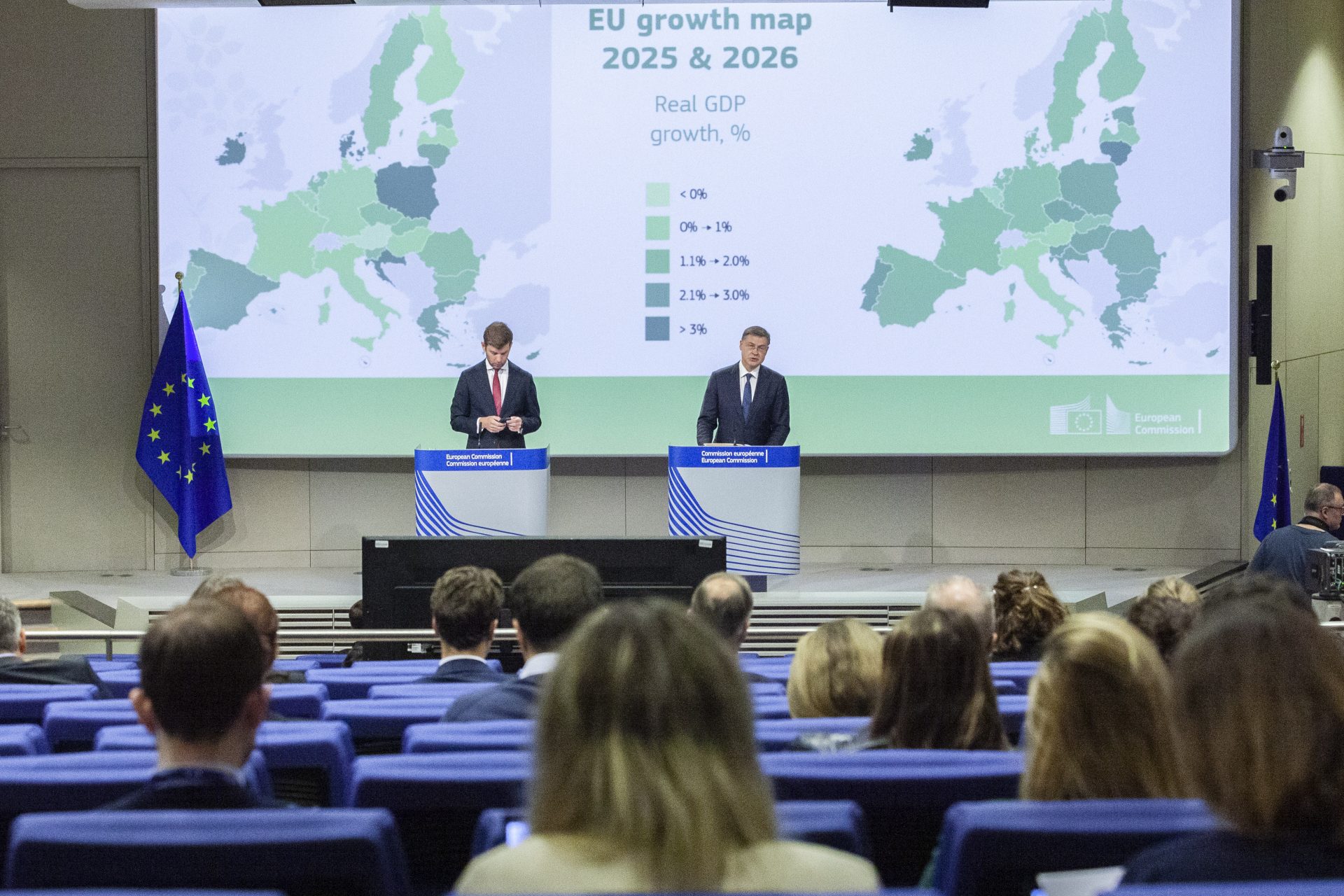Consistently above the Eurozone and EU average, the Greek economy

Consistently above the eurozone and EU average, the Greek economy is expected to maintain its strong momentum and grow by 2.3% in 2025 and 2.2% in 2026, according to the spring economic forecasts of the Commission that were made public.
The Commission has revised its growth estimate for Greece in 2024 upwards. From 2.1% which was the forecast last autumn, GDP growth in 2024 has been set at 2.3%, according to the Commission. As for 2025 and 2026, the Commission’s forecast remains stable compared to its autumn forecasts. GDP growth in Greece is expected to be 2.3% in 2025 and 2.2% in 2026, “thanks to sustained consumption and an increase in EU-funded investments”.
However, the Commission has revised down its forecasts for growth in the eurozone and the EU in 2025 and 2026, compared to the Autumn Forecasts. The Commission’s estimate for GDP growth in 2024 in the eurozone is 0.9% and 1.0% in the EU. For 2025, GDP is expected to increase by 0.9% in the eurozone and 1.1% in the EU, and in 2026 by 1.4% and 1.5% respectively. (In the autumn, the Commission’s forecasts for growth in the eurozone in 2025 were 1.3% in the eurozone and 1.5% in the EU, and for 2026 they were 1.6% in the eurozone and 1.8% in the EU).
Inflation in Greece is estimated at 3% in 2024 and is expected to moderate to 2.8% in 2025 and 2.3% in 2026, “with strong developments in wages and demand continuing to exert pressure on consumer prices”.
Inflation in the eurozone in 2024 is expected to be 2.4% and to moderate to 2.1% in 2025 and 1.7% in 2026.
Unemployment in Greece in 2024 stands at 10.1% and is expected to continue to decrease to 9.3% in 2025 and 8.7% in 2026.
“Greece achieved a significant fiscal surplus in 2024, which is expected to be maintained in the forecast horizon,” emphasizes the Commission. In 2024, the general government balance recorded a surplus of 1.3% of GDP. In 2025, the general government surplus is expected to decrease to 0.7% of GDP, and in 2026 it is projected to increase to 1.4% of GDP. Supported by the strong growth of nominal GDP, the debt-to-GDP ratio continues to decline and is expected to reach 140.6% in 2026.
THE REPORT ON GREECE
In more detail, the Commission’s report on Greece emphasizes that “the Greek economy maintains its momentum despite adversities”.
In 2024, Greece’s economy grew by 2.3%. This, according to the Commission, was largely fueled by private consumption, investments, and inventory accumulation. Despite the contractionary fiscal policy, domestic demand growth was strong and resulted in a significant increase in imports, while exports grew at a slower pace. As a result, net exports affected economic activity.
With the progress of the recovery and resilience plan, EU-funded investments are expected to be significant in 2025 and 2026. Together with sustainable strong consumption, supported by steady income growth, they are expected to be the main drivers of economic growth. Import demand is expected to remain strong, given the high import content of investments. Overall, GDP growth is expected to continue to exceed its long-term potential, at rates of 2.3% in 2025 and 2.2% in 2026.
According to the Commission, the Greek economy is expected to be only slightly affected by US tariffs, due to its relatively weak direct and indirect trade ties with the United States. However, risks to growth prospects have increased and lean downwards, as persistent trade growth and geopolitical uncertainty, along with the deterioration of global economic prospects, could negatively affect Greek exports, particularly tourism.
TIGHTER LABOR MARKET AND SUSTAINABLE WAGE GROWTH
The labor market has improved in recent years and favorable momentum continued in early 2025, the Commission estimates. After peaking in the first quarter of 2024, job vacancy rates have begun to decline, but still indicate a tight labor market, particularly in sectors related to tourism and those requiring high skills. Employment is expected to continue to expand, albeit at a slower pace, as skill gaps and low labor market participation, particularly among women, limit labor supply. In this context, real wages per employee are expected to increase further, on average by 1.3% annually over the forecast horizon. This is also supported by recent increases in minimum wages and reductions in social security contributions.
INFLATION WILL REMAIN ABOVE THE EUROZONE AVERAGE
General inflation averaged 3% in 2024, 0.6 percentage points above the euro area average. The deceleration of inflation has been constrained by the acceleration of service prices and the rise in electricity prices. Looking ahead, wages are expected to continue to exert upward pressure on prices. Therefore, service inflation is expected to slow only gradually over the forecast horizon. Overall, inflation is projected to be 2.8% in 2025 and 2.3% in 2026. Inflation excluding energy and food prices is expected to remain higher, at 3.5% and 2.6% in 2025 and 2026, respectively.
STRONGER FISCAL PROSPECTS DUE TO STRUCTURAL REFORMS
In 2024, the general government balance significantly exceeded expectations and recorded a surplus of 1.3% of GDP, compared to the projected deficit of 0.6% of GDP in the Autumn Forecasts. According to the Commission, this improvement is due to the subdued growth of current expenditures, higher-than-expected revenues from direct taxes, and strong collections from social security contributions, linked not only to the strong increase in employment but also to measures to combat tax evasion and undeclared work, such as the digital work card and stricter reporting requirements for VAT declarations.
In 2025, the general government surplus is expected to decrease to 0.7% of GDP. On the revenue side, the forecast reflects the higher baseline level due to stronger-than-expected revenue performance in 2024 and takes into account the increase in the overnight tax in hotels, structural measures to combat tax evasion, and the extension of the digital work card to the food and tourism sectors, aimed at reducing undeclared work and increasing local government fees.
These measures are expected to offset the impact of the planned 1 percentage point reduction in social security contribution rates and the increase in public sector wages. On the expenditure side, the forecasts incorporate a new package of measures, worth 0.5% of GDP, announced after the publication of the 2024 fiscal results, including the return of a monthly rent with income criteria, a permanent social benefit of 250 euros for low-income pensioners, uninsured elderly, and people with disabilities, and an annual increase of 500 million euros in the national investment budget.
In 2026, the general government surplus is projected to increase to 1.4% of GDP under the assumption of unchanged policy. This improvement is expected to be supported by the continuing increase in tax revenues and social security contributions, which are expected to offset rising expenditures for pensions and public sector wages. Fiscal policy is expected to be expansionary, supported by EU funding, in both 2025 and 2026.
The public debt-to-GDP ratio is expected to continue to decline to 146.6% in 2025 and 140.6% in 2026. The reduction is due to the increase in nominal GDP as well as budget surpluses. (19/5/25)
What's Your Reaction?
 Like
0
Like
0
 Dislike
0
Dislike
0
 Love
0
Love
0
 Funny
0
Funny
0
 Angry
0
Angry
0
 Sad
0
Sad
0
 Wow
0
Wow
0





















































.png?Expires=1838763821&Key-Pair-Id=K2ZIVPTIP2VGHC&Signature=IO0~CT3pU-TcxGc~yoZSmoQx23MZVuK-~4jSii~NKEblRmyO3el7NXPu~Rh1o23voASg7hlcHLw4kvQuDK1jssEhcjoNBBvEpZ~GGOAU6yosBhpHpeF179F~h7i6VxmsBNh9gtTutkoqY73O2YCFey~IAqSzKbBqETP1kP9cAg1916Z1YkJJs-5MliMrkZ5d7-mWGLbpHp2wGj2VlMph8XzYlL4~y1O7fB~JdIS~Rs4RMRs2x0WT1qUIpHAsf3GdwtOyAmKFSpIg8xCyNGZZ5h~13nXlmpd7uPvW8tBfttpG9pFTqcway-uch5WyfHOEfi7UlJCOWrr6fCYY5PMgSg__)







